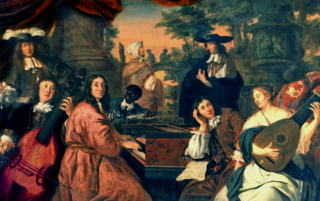This article needs additional citations for verification .(January 2022) |
| |||
|---|---|---|---|
| +... |
The year 1674 in music involved some significant events.
This article needs additional citations for verification .(January 2022) |
| |||
|---|---|---|---|
| +... |
The year 1674 in music involved some significant events.
This is a list of music-related events in 1804.
This is a list of music-related events in 1805.
This is a list of music-related events in 1818.
This is a list of music-related events in 1803.

Johann Adam Reincken was a Dutch/German organist and composer. He was one of the most important composers of the 17th century, a friend of Dieterich Buxtehude and a major influence on Johann Sebastian Bach; however, very few of his works survive to this day.
The year 1706 in music involved some significant events.
The year 1707 in music involved some significant events.
The year 1705 in music involved some significant events.
The year 1694 in music involved some significant events.
The year 1692 in music involved some significant events.
The year 1680 in music involved some significant events.
Gustaf Düben was a Swedish organist and composer.
Giovanni Battista Pescetti was an organist, harpsichordist, and composer known primarily for his operas and keyboard sonatas. Musicologist and University of California, Santa Barbara professor John E. Gillespie wrote that Pescetti "stylistically stands as a bridge between Alberti and Domenico Scarlatti".
The year 1672 in music involved some significant events.
The year 1668 in music involved some significant events.
The year 1667 in music involved some significant events.
The year 1666 in music involved some significant events.

The year 1662 in music involved some significant events.
The year 1660 in music involved some significant events.

Mit Fried und Freud, BuxWV 76, is the common name for a piece of funeral music composed by Dieterich Buxtehude as an homage to his father in 1674. The composer named the work Fried- und Freudenreiche Hinfarth when he published it the same year. It is a bundle of two compositions, the earlier Mit Fried und Freud, BuxWV 76a, a setting of Luther's hymn Mit Fried und Freud ich fahr dahin composed in 1671 reflecting the death of Menno Hanneken, and the elegy Klag-Lied, BuxWV 76b, an aria in seven stanzas. The incipit of the elegy, "Muß der Tod denn auch entbinden", translates roughly to "Even if death must separate us". It is one of few compositions published during Buxtehude's lifetime.